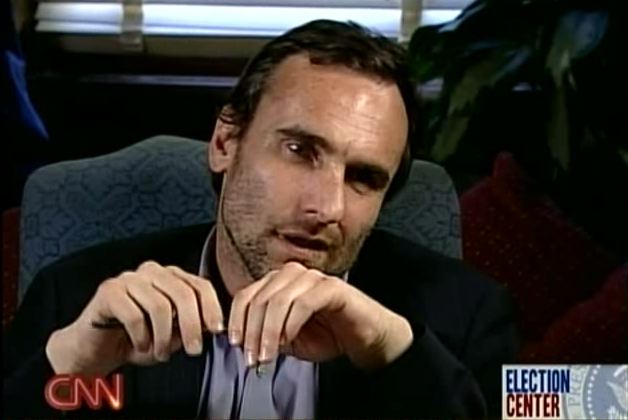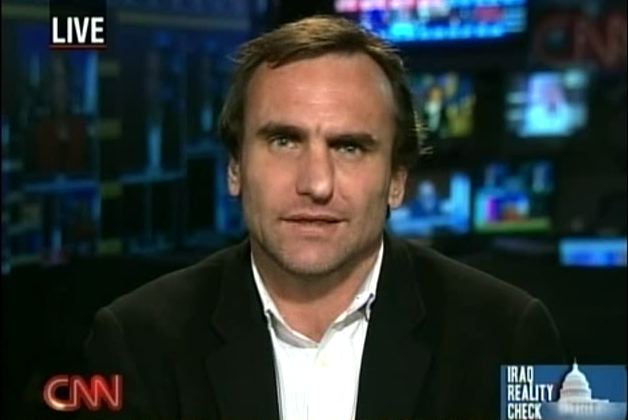EC: "A much more nuanced view of the Democrats' view of a withdrawal from Iraq."

Length: 5:41
LARGE (66.5 MB) ----- SMALL (6.6 MB)
Campbell Brown talks with both Michael and Candy Crowley about the politics of the hearings. Michael also shows part of an interview he did last week with Senator John Kerry (and despite what Campbell says, it was conducted last Wednesday).
CAMPBELL BROWN: This was day two of testimony on Capitol Hill for the top American officials in Iraq.
General David Petraeus says it is unlikely he will call for another troop buildup, but he also can't say when more troops will come home. During more than seven grueling hours in front of House members, Petraeus and Ambassador Ryan Crocker made it clear they think a rapid U.S. withdrawal, like the Democrats have been calling for, would be risky.
The general told lawmakers he's just as frustrated as they are, but he can't be more specific about bringing more troops home.
(BEGIN VIDEO CLIP)
GENERAL DAVID PETRAEUS, COMMANDING GENERAL OF THE MULTI-NATIONAL FORCE-IRAQ: We very much share the frustration. Those of us who have been at this for a long time obviously want the war to end as much as anybody else, perhaps maybe more. We're not after the Holy Grail in Iraq. We're not after Jeffersonian democracy. We're after conditions that would allow our soldiers to disengage. And that is in fact what we are doing.
(END VIDEO CLIP)
BROWN: After two days of hearings, it's clear that Democrats are starting to come to terms with the fact that there is no quick way out of Iraq.
And our Baghdad correspondent, Michael Ware, has been watching the Iraq hearings in Washington. He's joining us now, along with senior political correspondent Candy Crowley, who is in South Bend, Indiana, where Senator Barack Obama is campaigning.
And, Michael, let me start with you. You had a chance today to talk with Foreign Relations Committee member and 2004 Democratic presidential nominee John Kerry.
Let's listen to part of your interview now.
(BEGIN VIDEO CLIP)
SEN. JOHN KERRY (D), MASSACHUSETTS: This is not dissimilar to Vietnam. Right now, this war is about a hole we have dug for ourselves, which we can't get out of easily without a perception of loss.
It's deeply frustrating, because we're spending $10 billion to $12 billion a month putting young Americans' lives on the line for a status quo that is almost absolutely certainly going to be there when the next president comes in next January, if it isn't worse.
MICHAEL WARE, CNN CORRESPONDENT: And whilst it was this current administration that created this problem set, you're saying that the next administration can essentially walk away, be it in a responsible manner or -- or not?
KERRY: Walk away is a very loaded word and a dangerous word. And I'm not talking about walking away.
If you -- if you simply withdrew them and left everybody to their own devices, there's going to be a greater level of violence than the violence that would exist anyway. I mean, that, I am convinced of.
But if you come in and they have a sense, wow, America is now gearing up for how they begin to withdraw, and what they leave when they withdraw is something we're going to have to deal with, because we're here, you have begun to shift the dynamics in a way that begins to tell you better exactly what your options really are and how you begin to play that out.
(END VIDEO CLIP)
BROWN: Michael and Candy back with us now.
And, Michael, let me ask, did you walk away from that interview with Kerry today feeling like he had a real sense for the reality on the ground in Iraq, as you see it?
WARE: Well, yes and no. Certainly, what we heard from Senator Kerry, from what I understand, is a much more nuanced view of the Democrats' view of a withdrawal from Iraq. It's simply not the bumper-sticker version that we're hearing from the Democratic candidates fighting it out for nomination right now.
He's talking about maintaining some kind of a presence and reshaping America's focus. He was aware of the vacuum that American withdrawal will leave. However, he did not seem, I think, to be quite aware of the realities of Iran's role, in the sense of how Iran will fill that vacuum.
He was very much looking to Iran to evolve into a much more benign influence in the region. Now, he believes that renewed American diplomatic efforts can help shape that. But he also talked about this blood that will flow after America retreats, or America withdraws.
Now, he seemed to think that, in whatever conflict might emerge, eventually, there will be a power equilibrium between rival factions. Now, in that, I think that could be wishful thinking. And if that's the premise for a Democratic plan going forward, that could be potentially dangerous -- Campbell.
BROWN: And, Candy, Democrats are in a tough spot here. And I'm not just talking about the presidential candidates, but Democrats in general.
They have got their constituents saying, bring the troops home, you know, listening to these generals saying, you know, advising against it, saying there's no real easy way to do that. How are they managing it?
CANDY CROWLEY, CNN SENIOR POLITICAL CORRESPONDENT: Well, they're managing it -- this is a large dose of reality.
You remember, Campbell, we went through so many votes last year about timetables for withdrawal, about under what conditions the troops would come home, time and time again. You don't see those votes anymore, because the reality is, they had hoped that along the way, as the war progressed, they would be able to pick off some Republicans, that they would be able to set a timetable.
But with the surge came some sort of "improvement" -- and we will put that in quotations -- on the ground, so the Republicans did not defect in the way the Democrats thought they would. The reality is that only one thing is going to change this dynamic, and the Democrats know that. And that is November elections. And that won't even begin to take shape, whoever is elected, until January of next year. So, they have come to understand reality.
And I think, as you saw in today and yesterday, was that kind of frustration.
BROWN: All right, stay there, guys. I want to talk about whether the general's testimony is changing what Senators Clinton and Obama are saying on the trail -- coming up next.

Length: 3:45
LARGE (44.0 MB) ----- SMALL (4.4 MB)
CAMPBELL BROWN: General David Petraeus and Ambassador Ryan Crocker were back on Capitol Hill today talking about Iraq.
Meanwhile, on the campaign trail, two of the presidential candidates were also talking about the war and what they plan to do about it.
(BEGIN VIDEO CLIP)
CLINTON: One candidate will continue the war and keeping troops in Iraq indefinitely. One candidate only says he will end the war. And one candidate is ready, willing and able to end the war.
OBAMA: The person you want answering the phone at 3:00 a.m. is the person who has read the intelligence reports, who is asking the tough questions about why we want to invade a country like Iraq that had nothing to do with 9/11. You want to have somebody who has good judgment.
And there's only one out of the remaining candidates who qualifies on that front.
(END VIDEO CLIP)
BROWN: With me again, senior political correspondent Candy Crowley and Baghdad correspondent Michael Ware.
And, Candy, let me go to you on this. Here are the candidates differentiating themselves on the war in Iraq, but do the voters, do you think, really see a difference between the two of them? And I'm talking about the Democrats -- in terms of going forward, what they would do if elected?
CROWLEY: In terms of going forward, they don't. I think the Democratic Party, certainly those who came out in the primary season, made up their minds a while back that, no matter who they nominated -- and this was when Joe Biden was still in the race and Chris Dodd and Bill Richardson -- they made up their minds that all of these candidates would put the war on a sharply different path, towards an exit plan.
So, I think they made up their minds. Then, as you recall, Hillary Clinton, who had voted for the war, got a pretty tough start on her presidential campaign. She got booed a couple of times when she went before Democrats. But she was able to pivot, became an anti-war person out front. And now I think, basically, that particular issue has been put to rest.
The experience issue is something else, who's got the best experience to actually put this plan into action. But I think as far as the issue itself, most Democratic voters believe that either one of these candidates would get them out of Iraq.
BROWN: And, Michael, based on your experience on the ground there, if anybody's withdrawal plan were put into effect, what do you think happens?
WARE: Well, it depends on the nature of that withdrawal plan.
But, certainly, in the pure sense of what I think much of the Democratic base is hoping for, is simply an end to this war under any circumstances, there would be disaster of an unholy scale. I mean, really, there would be blood flowing. There would be regional proxy war. And that's something that I have noticed, for example, with Ambassador Ryan Crocker's testimony.
When he's been asked about what would be the consequences or what would happen if we withdrew too soon, he's not gone as far as, say, he did with us just a few weeks ago, where he said his grave concern is that you would see a regional proxy war develop in and around Iraq involving three of the world's richest oil reserves.
And what we're essentially talking about is a situation like Lebanon in the 1980s, with militia forces going against each other and infighting, all with foreign backers. And, really, that's what we're talking about, is a vacuum and what it will be filled with. And it will be filled with violence and it will be filled with the interests of many of America's adversaries.
BROWN: All right, Michael Ware for us, his expertise, along with Candy Crowley and her expertise from the campaign trail.
Thanks to both of you. Appreciate it.
